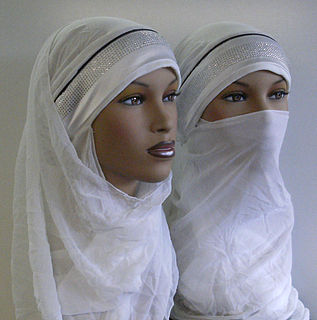
A burqa or burka, also known as a chadaree in Afghanistan or a paranja in Central Asia, is an enveloping outer garment which covers the body and the face that is worn by women in some Islamic traditions. The Arab version of the burqa is called the boshiya, and is usually black in color.

Simone Veil was a French magistrate and politician who served as Health Minister in several governments and was President of the European Parliament from 1979 to 1982, the first woman to hold that office. As health minister, she is best remembered for advancing women's rights in France, in particular for the 1975 law that legalized abortion, today known as Loi Veil. From 1998 to 2007, she was a member of the Constitutional Council, France’s highest legal authority.

Islamic clothing is clothing that is interpreted as being in accordance with the teachings of Islam. Muslims wear a wide variety of clothing, which is influenced not only by religious considerations, but also practical, cultural, social, and political factors. In modern times, some Muslims have adopted clothing based on Western traditions, while others wear modern forms of traditional Muslim dress, which over the centuries has typically included long, flowing garments. Besides its practical advantages in the climate of the Middle East, loose-fitting clothing is also generally regarded as conforming to Islamic teachings, which stipulate that body areas which are sexual in nature must be hidden from public view. Traditional dress for Muslim men has typically covered at least the head and the area between the waist and the knees, while traditional women's dress conceals the hair and the body from the ankles to the neck. Some Muslim women also cover their face. Islamic dress is influenced by two scriptural sources, the Quran and hadith. The Quran provides guiding principles believed to have come from God, while the body of hadith describes a human role model through the traditions of the Islamic prophet Muhammad. The branch of fashion industry influenced by Islamic principles is known as Islamic fashion.

A niqāb or niqaab, also called a ruband, is a garment that covers the face, worn by many Muslim women as a part of an interpretation of hijab. The terms niqab and burqa are often confused; a niqab covers the face while leaving the eyes uncovered, while a burqa covers the entire body from the top of the head to the ground, with only a mesh screen allowing the wearer to see in front of her. According to the majority of Muslim scholars and Islamic schools of thought, face veiling is not a requirement of Islam. Those Muslim women who wear the niqab, do so in places where they may encounter non-mahram (un-related) men.
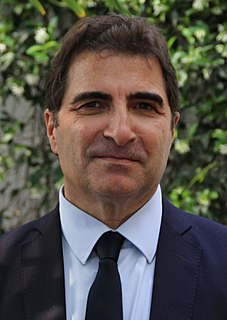
Christian Jacob is a French politician who has been the president of the Republicans party since 2019. Over the course of his career, he held several cabinet positions, including as the Minister of French Civil Service in Jacques Chirac's second term as President of France.
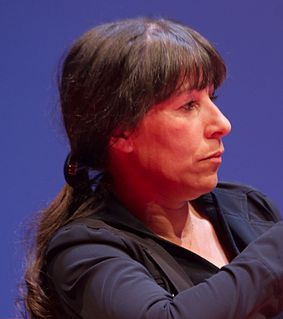
Fadela Amara is a French feminist and politician, who began her political life as an advocate for women in the impoverished banlieues. She was the Secretary of State for Urban Policies in the conservative Union for a Popular Movement (UMP) government of French Prime Minister François Fillon. She is a former president of the organisation Ni Putes Ni Soumises.

The Islamic scarf controversy in France, referred to there as l'affaire du voile, l'affaire du voile islamique, and l'affaire du foulard, arose in 1989, pertaining to the wearing of the hijab in French public schools. It involved issues of the place of Muslim women, differences between Islamic doctrine and Islamic tradition, the conflict between communitarianism and the French policy of minority assimilation, discussions of the "Islamist threat" to French society and of Islamophobia.
Hijab and burka controversies in Europe revolve around the variety of headdresses worn by Muslim women, which have become prominent symbols of the presence of Islam in especially Western Europe. In several countries, the adherence to hijab has led to political controversies and proposals for a legal partial or full ban in some or all circumstances. Some countries already have laws banning the wearing of masks in public, which can be applied to veils that conceal the face. Other countries are debating similar legislation, or have more limited prohibitions. Some of them apply only to face-covering clothing such as the burqa, boushiya, or niqab; some apply to any clothing with an Islamic religious symbolism such as the khimar, a type of headscarf. The issue has different names in different countries, and "the veil" or hijab may be used as general terms for the debate, representing more than just the veil itself, or the concept of modesty embodied in hijab.
Alain Marc is a member of the French Senate, who represents the department of Aveyron.

Alain Néri is a French politician. He was the deputy for Puy-de-Dôme's 2nd constituency from 1997 to 2011 in the National Assembly of France. He was then senator for Puy-de-Dôme from 2011 to 2017. He is a member of the Socialiste, radical, citoyen et divers gauche.
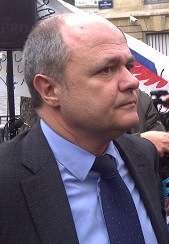
Bruno Le Roux was the Minister of the Interior of France from 6 December 2016 to 21 March 2017. He was a member of the National Assembly of France where he represented the Seine-Saint-Denis department and was the leader of the Socialist, Ecologist & Republican Group. He led the Socialist Party in the National Assembly from 2012 until 2016. On 6 December 2016 he was named Minister of the Interior in the Government of Bernard Cazeneuve.

Jacques Grosperrin is French politician of The Republicans who has been a member of the Senate since the 2014 elections, representing the Doubs department. Previously he served as a member of the National Assembly of France from 2007 until 2012.

Jean-Luc Warsmann is a French politician of the Republicans who has been serving as a member of the National Assembly of France, representing the Ardennes department.

Maxime Gremetz was a member of the National Assembly of France. He represented the Somme's 1st constituency, and is a member of the French Communist Party and Gauche démocrate et républicaine. According to Michel Foucault Gremetz's response to the Polish Communist government's outlawing of Solidarity was to declare that the ban was necessary to avoid civil war.

Philippe Folliot is a French politician who serves as a member of the National Assembly of France, representing the Tarn department. He is the founder of the Centrist Alliance.

Stéphane Demilly is a French politician of the Union of Democrats and Independents (UDI) who served as a member of the National Assembly of France from 2002 until 2020, representing the Somme department.

François Calvet is a French politician, a member of the National Assembly. He represents the Pyrénées-Orientales department, and is a member of the Union for a Popular Movement. On 25 September 2011 he was elected senator of the Pyrénées-Orientales and therefore leaves the National Assembly. His deputy is Jean-Pierre Romero, mayor of Port-Vendres. He is a member of the Study Group on the question of Tibet of National Assembly.

The French ban on face covering is an act of parliament passed by the Senate of France on 14 September 2010, resulting in the ban on the wearing of face-covering headgear, including masks, helmets, balaclavas, niqābs and other veils covering the face in public places, except under specified circumstances. This ban does not apply to the hijab, as it does not cover the face. The ban also applies to the burqa, a full-body covering, if it covers the face. Consequently, full body costumes and Zentais were banned. The bill had previously been passed by the National Assembly of France on 13 July 2010. In April 2011, France became the first European country to impose a ban on full-face veils in public areas.
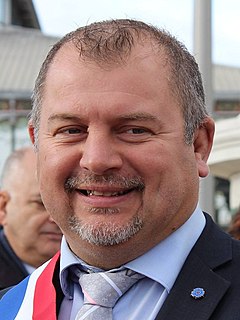
Alain Péréa is a French politician of La République En Marche! (LREM) who was elected to the French National Assembly on 18 June 2017, representing the department of Aude.
The Neuwirth Law is a French law which lifted the ban on birth control methods on December 28, 1967, including oral contraception. It was passed by the National Assembly on December 19, 1967. The law is named after Lucien Neuwirth, the Gaullist politician who proposed it. It replaced a law from 1920 that not only forbade all forms of contraception, but also information about contraception. The law was not fully implemented until 1972 due to administrative delays.
















